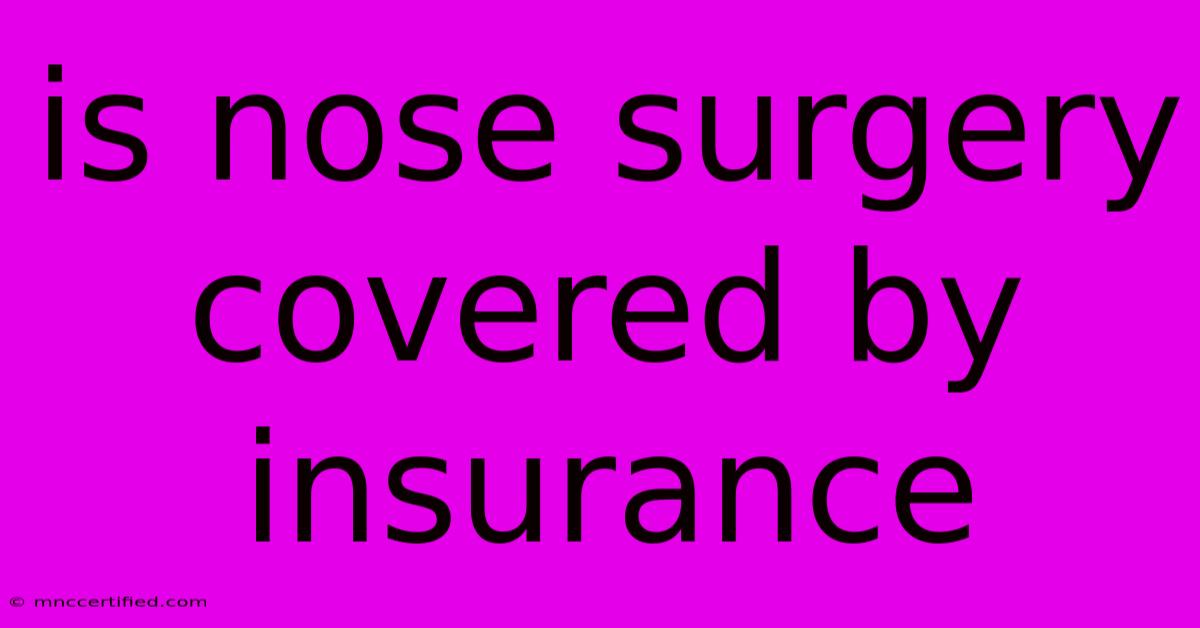Is Nose Surgery Covered By Insurance

Table of Contents
Is Nose Surgery Covered by Insurance? A Comprehensive Guide
Considering a rhinoplasty, commonly known as a nose job, is a big decision. It's natural to think about the costs involved, and one crucial question is: will my insurance cover it?
Unfortunately, the answer isn't a simple yes or no. Insurance coverage for nose surgery varies widely based on several factors, including:
- Your insurance plan: Different plans have different coverage policies. Some may cover medically necessary procedures, while others may offer coverage for cosmetic procedures depending on the specific policy.
- The reason for the surgery: Medical necessity is key. If your nose surgery is required due to a health issue, like breathing problems or a deviated septum, your chances of coverage increase.
- Your location: State laws and insurance regulations can vary.
- The surgeon and facility: Not all surgeons or facilities are in-network with all insurance companies.
Understanding Medical Necessity vs. Cosmetic Enhancement
The distinction between medical necessity and cosmetic enhancement is critical. Let's break it down:
- Medically Necessary Rhinoplasty: This type of surgery addresses issues like:
- Breathing difficulties: A deviated septum or nasal obstruction can significantly impact breathing.
- Frequent sinus infections: Nasal structure issues can make you more prone to infections.
- Structural damage: Injuries or birth defects can affect your nose's function.
- Cosmetic Rhinoplasty: This type of surgery aims to improve the appearance of the nose, addressing:
- Size: Adjusting the size of the nose to achieve a more balanced look.
- Shape: Reshaping the tip, bridge, or overall contour.
- Symmetry: Correcting asymmetries to improve the appearance.
It's important to note that even if your surgery is deemed medically necessary, your insurance may only cover a portion of the costs.
What You Can Do To Increase Your Chances of Coverage
- Talk to your doctor: Discuss your concerns and medical history. Your doctor can help determine if your condition warrants a medically necessary rhinoplasty.
- Check your insurance policy: Review the details of your plan to understand coverage limits and exclusions.
- Contact your insurance company: Discuss your situation and the procedure with them directly. Ask about pre-authorization requirements and potential coverage.
- Consider alternative options: In some cases, less invasive treatments like nasal sprays or steroid injections might be covered and could address your concerns.
Exploring Financing Options for Nose Surgery
If your insurance doesn't cover the full cost, consider these options:
- Health Savings Account (HSA): If you have an HSA, you can use pre-tax dollars to pay for medical expenses, including surgery.
- Flexible Spending Account (FSA): Similar to an HSA, an FSA allows you to set aside pre-tax funds for medical expenses.
- Medical Loan: These loans are specifically designed for medical expenses and often have lower interest rates than personal loans.
- Payment Plans: Some surgeons offer payment plans to help spread out the cost of the procedure.
The Bottom Line
Determining whether nose surgery is covered by insurance is a complex process. It's essential to consult your doctor, review your insurance policy, and explore all financing options. By being informed and proactive, you can make the best decision for your health and finances.

Thank you for visiting our website wich cover about Is Nose Surgery Covered By Insurance. We hope the information provided has been useful to you. Feel free to contact us if you have any questions or need further assistance. See you next time and dont miss to bookmark.
Featured Posts
-
Bitcoin Surges Past 81 000 After Trump Win
Nov 11, 2024
-
Sheffield United Vs Sheffield Wednesday Live Tv Coverage
Nov 11, 2024
-
Watch Real Sociedad Vs Opponent La Liga Online
Nov 11, 2024
-
Week 10 Eagles Vs Cowboys Key Stats
Nov 11, 2024
-
Snipes Insurance Dunn North Carolina
Nov 11, 2024